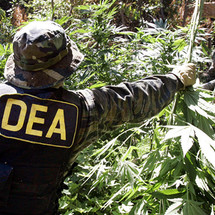Sep 21st 2020
DEA May Threaten CBD And Hemp Industry
NEW DEA RULE MAY THREATEN CBD AND HEMP INDUSTRY
Manufacturers of CBD and Delta-8 THC products may face criminal prosecution in line with the new rule from the Drug Enforcement Administration (DEA). Information gathered from the DEA shows that the new rule issued on August 20, 2020, was a matter of urgency. This was to adjust its regulations and account for the changes affected by the Controlled Substances Act that legalized the use of hemp products in 2018.
According to the DEA, the new rule “merely conforms DEA's regulations to the CSA statutory amendments that have already taken effect.” While the agency believes the new rule does not break any grounds, CBD and cannabis experts believe the agency is creating an easy pathway for law enforcement agencies to prosecute processors and manufacturers or CBD, hemp, and delta-8 THC products. The new DEA rule's main challenge is declaring partially processed CBD and synthetically derived delta-8 THC as illegal.
It is believed that partially processed CBD may contain a high concentration of Delta-9 THC (the psychoactive compound in CBD). It is often referred to as “work in progress Hemp extract (WIPHE), and since it may contain more than the required 0.3% THC, the DEA believes it should be regarded as illegal.
What Does That Mean For CBD?
According to the new law, “a cannabis derivative, extract, or product that exceeds the 0.3% D9-THC limit is a schedule I controlled substance, even if the plant from which it was derived contained 0.3% or less D9-THC on a dry weight basis.”'
By making the possession of WIPHE illegal, the DEA is putting all manufacturers of CBD products into harm’s way since it is always in their possession. WIPHE serves as an important ingredient for the formulation of CBD and hemp products.
Apart from declaring WIPHE as Illegal, the DEA believes Delta-8 THC is synthetically derived and should be considered illegal. This submission remains unchanged even when Delta-8 THC is derived from cannabis and marijuana plants.
Conclusion
If you want to protect CBD products, we urge you to contact your local representative, and voice your concerns. Don’t forget to contact us if you have any questions. Our team of CBD experts and researchers will love to hear from you soon.

